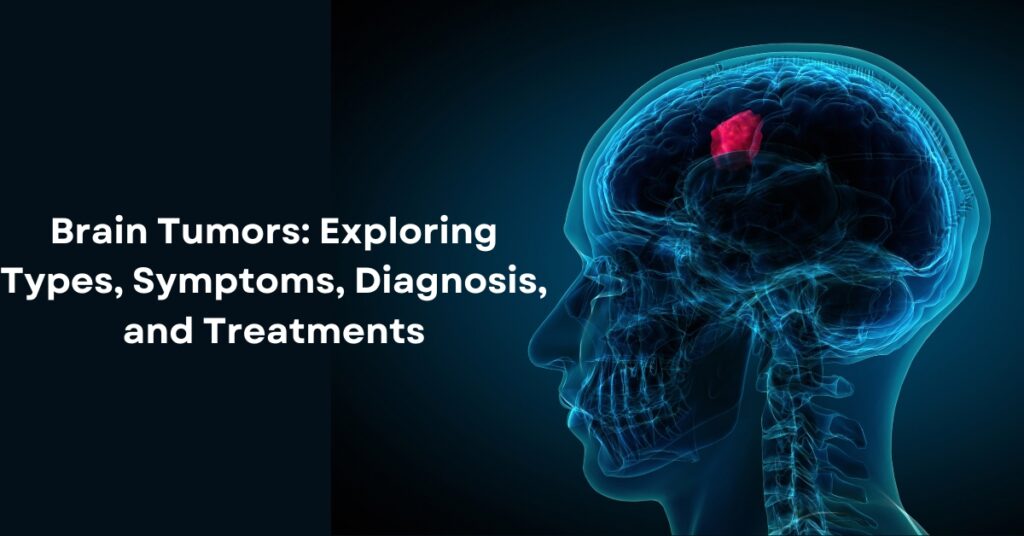Brain Tumors: Exploring Types, Symptoms, Diagnosis, and Treatments

The brain is the control room of the human body. What happens when it faces glitches? Hard to imagine, right? Every organ of the human body is susceptible to damage, including the brain. Brain tumors are a common abnormality that hinders the healthy functioning of the brain. Let’s learn more about these.
Brain tumors are abnormal growths of cells in the brain, a complex organ responsible for various nervous system functions. They can occur in any part of the brain or skull, including its protective lining, the brainstem, sinuses, nasal cavity, and others. Over 120 different types of brain tumors are known to arise from different tissues in the brain.
What are the different types of brain tumors?
Brain tumors arise in different stages, each with unique origins and characteristics:
- Gliomas: These tumors originate from glial cells, which provide support and protection to the nervous system of the brain. Gliomas include astrocytomas, oligodendrogliomas, and ependymomas.
- Meningiomas: Found in the lining that protects the brain and spinal cord, meningiomas typically begin as benign and progress slowly.
- Pituitary adenomas: These tumors develop in the pituitary gland, a small gland at the base of the brain. They can disrupt hormone production and function.
- Medulloblastoma: Primarily occurring in children, this brain tumor interferes with movement and balance.
- Schwannomas (or acoustic neuromas): Derived from Schwann cells, which provide a myelin sheath over nerve fibers, these tumors often affect nerve perception related to hearing and balance.
- Craniopharyngiomas: This tumor arises near the pituitary gland and can disrupt hormone balance, vision, and other functions.
- Pineal gland tumors: These tumors of the pineal gland can interfere with the sleep-wake cycle.
- Germ Cell Tumors: Originating from germ cells that develop into sperm and eggs, these tumors arise in various areas of the brain, including the pineal and pituitary glands.
These are just a few examples of brain tumors, each with unique symptoms and often requiring different treatment modalities.
Recent posts
Recognizing the Symptoms of Multiple Myeloma Early Multiple myeloma, a type of blood cancer, is a rare but serious condition that affects …
Home >> Colorectal Cancer Awareness Month: Educate, Prevent, and Detect Early What is Colorectal Cancer Awareness Month? Colorectal Cancer Awareness Month is …
What are the symptoms of brain tumors?
The symptoms of brain tumors are dependent on various factors, including their location, size, and growth rate. As a result, it has the tendency to disrupt the functions of affected parts of the brain. When the cerebellum has tumors, it causes abnormalities in movements, coordination, and balancing activities. On the other hand, tumors near the optic pathway can cause visual disturbances. However, common symptoms that appear before the diagnosis of the tumor are:
- Headaches
- Seizures
- Cognitive difficulties
- Changes in personality (mood swings or alterations in behavior)
- Weakness or paralysis
- Balance issues or dizziness
- Visual disturbances (blurred vision or double vision)
- Hearing problems
- Numbness or tingling sensations
- Nausea or vomiting
- Confusion and disorientation
How are brain tumors diagnosed?
Diagnosis of a brain tumor involves a comprehensive physical examination, including brain imaging studies like MRI, CT scans, and biopsy if possible. Other tests like lumbar punctures and evoked potential studies, which can be used to confirm the diagnosis and to see the characteristics of the tumor, would be done. Accurate diagnosis is important for developing individualized treatment plans and to effectively prognosticate patient outcomes
How are brain tumors treated?
Even though brain tumors are treated with a thorough approach, taking care of each patient individually based on his or her unique situation is a major aspect of modern medicine. The combination of the most recent medical technologies with treatment methods makes it possible to offer a wide range of options compatible with individual needs.
- Surgery: Surgeons aim to extract as much of the tumor as possible while sparing the functions of the brain. High-precision tools, including imaging and navigation, are used by surgeons to accurately locate and remove the tumor with minimal damage to healthy tissue.
- Radiation Therapy: This type of therapy uses high-energy beams to pinpoint and shrink the size of the tumors. It can be delivered externally or by inserting radioactive material directly into the tumor.
- Chemotherapy: Medications kill tumor cells or slow their growth. The medications can be taken by mouth or injection and work by targeting fast-growing cells, like those found in tumors.
- Immunotherapy: This treatment utilizes the human body’s immune system to fight against tumor cells. By enhancing the body’s natural defenses, immunotherapy offers the hope of long-term control of the disease.
- Targeted Therapy: Targeted treatments focus on specific molecules that drive the growth of a tumor. By blocking these molecules, targeted therapies are able to slow or stop the growth of a tumor with fewer side effects compared to traditional chemotherapy.
- Watchful Waiting (Active Surveillance): Sometimes, the best strategy is to closely monitor the tumor over time. This way, doctors can intervene if the tumor changes but avoid unnecessary treatments and their possible risks.
- Symptom Management: Symptomatic management and improvement in quality of life should be ensured throughout the treatment process. Techniques like the placement of shunts to relieve pressure in the brain, medications to control seizures or pain, and support services for emotional well-being all play a crucial role in the treatment process.
Management of brain tumors requires a team effort—doctors, nurses, and specialists must work together to provide the best care for the patient. By combining different methods of treatment and approaches, healthcare teams can offer comprehensive care that addresses both the physical and emotional needs of patients.
What are the differences between brain tumors and lesions?
A brain tumor is a specific type of brain lesion, with a lesion referring to any area of damaged tissue. Not all lesions are tumors; they can also result from stroke, injury, encephalitis, or arteriovenous malformation. This distinction is crucial in accurately diagnosing and treating brain abnormalities, as the underlying cause guides the appropriate course of action and treatment plan.
What are the differences between cancerous and non-cancer brain tumors?
There are two main types of brain tumors: cancerous and non-cancerous. Cancerous or malignant tumors grow rapidly and aggressively, sometimes invading surrounding brain tissue and even spreading to other parts of the brain or body. They tend to show severe neurological symptoms and will require intensive treatment, including surgery, radiation therapy, and chemotherapy.
On the other hand, benign tumors grow slowly with well-defined borders. Therefore, they are less likely to invade surrounding brain tissues and spread to other parts of the brain or body. While they can cause symptoms such as headaches or some mild neurological deficits, non-cancerous tumors might not necessarily require treatment without symptoms or an increased risk of further complications. Treatment options for non-cancerous tumors include observation with periodic imaging or excision of the tumor using surgery.
Lastly, benign tumors are comparatively less harmful than cancerous tumors, but they also require equal attention and prompt care. Early detection can help in eradicating the tumor completely without much difficulty. If neglected or left untreated, the symptoms may aggravate and lead to further discomfort. Therefore, it is important to keep an eye on your health and make sure to see your healthcare practitioner for routine checkups.
About Author
Dr. A. Venugopal
MD (General Medicine), DM (Medical Oncology), MRCP – SCE Medical Oncology (UK), ECMO (Switzerland).
Dr A. Venugopal is One of the best medical oncologist and Hemato Oncologist in hyderabad, currently serving as the Head of the Department and Senior Medical Oncologist, Hemato Oncologist at Pi Health Cancer Hospital in Gachibowli, Hyderabad. He brings over 15 years of extensive experience in the field of Oncology.



